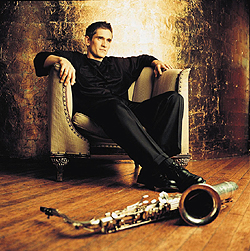 Curtis Stigers
Curtis Stigers
'An Emotional Plea'
Curtis Stigers is at the forefront of a new generation of jazz singers. With one of the most distinctive voices in music, Stigers pushes the boundaries of conventional jazz performers and expands the jazz repertory, creating modern jazz standards. Throughout his career, singer/songwriter/saxophonist Stigers has been celebrated for a surprisingly wide variety of impressive accomplishments—from his early pop chart success with several self-penned, top-ten singles and hit albums and an appearance on the soundtrack for "The Bodyguard" (one of the biggest selling albums of all time), to Downbeat Magazine naming him as one of the jazz genre's "Rising Male Stars" and the London Times selecting his recording, 'You Inspire Me,' as the number one jazz album of 2003.
With his latest album 'Real Emotional', Stigers delivers a sumptuous twelve-pack of "great songs" that includes impressive renderings of new standards written by the crème de la crème of contemporary pop songwriters (comprising Bob Dylan, Emmylou Harris, Stephin Merritt of Magnetic Fields, Tom Waits, Paul Simon, Dan Zanes and Randy Newman), a lush take on a Great American Songbook classic (Hoagy Carmichael's "Stardust"), a funk-inflected jaunt through Mose Allison's witty "Your Mind Is on Vacation," and three indelible originals that stand tall as highlights among the covers.
Chatting recently with Curtis Stigers, I first wondered just how a teen growing up in Boise, playing in punk and blues bands initially made it out - and via the heady world of the pop charts - finally secured the title of becoming a renowned jazz singer?
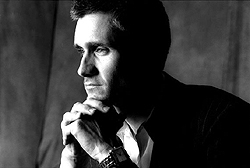
Curtis Stigers "I grew up not just playing in punk cover bands and saxophone in blues bands, but also in studying jazz at school. So, I definitely grew up a jazz musician as well as everything else. When I was a kid you could hear so many different things on the radio. Even on pop radio you heard great country music, soul music; Led Zeppelin, Neil Young and Joni Mitchell. You heard everything. It was much less decompartmentalized than the music business is now. I just loved music. I put on 'Songs In The Key of Life' by Stevie Wonder and then I'd listen to 'London Calling' [The Clash] after that. It didn't occur to me that you weren't supposed to like different things. And that translated itself into my playing music as well. I wanted to be Neil Young, I wanted to be Elvis Costello, and I wanted to be Willie Nelson. I thought he was cool even when it wasn't cool to think he was cool," he laughs.
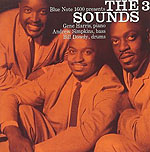
"Another big influence on me growing up in Boise was Gene Harris, who was a legendary pianist who had a group called The Three Sounds back in the '50s and '60s and early '70s. He retired to Boise in the late '70s and lived here till the end of his life. And he had a jam session every Tuesday night - because he kept playing, he was just not on the road. And that time period fell so perfectly into the period of time I was coming up as a musician here. So, when I was about 15 I was going into his jam sessions and playing with one of the greatest jazz musicians on the planet. Not really realizing who he was, but realizing how great he was. So, that was a great influence on me."
"But, Monday night back here as a kid in Boise, I played with the local blues band and learnt about Muddy Waters, B.B. King, Albert King, and Albert Collins. Tuesday's I'd go to Gene's jazz jam sessions and the rest of the week I'd either be playing drums in a new wave and punk cover band, or playing saxophone with a band that played a lot of Motown. A cool kinda dance band that would play a Bob Marley tune, followed by a tune by The Police, followed by an Elvis Costello song, followed by a Smokey Robinson song, and so on."
"So I came up being someone who was open minded. So, when I got my first record deal it was a pop deal. And I assumed as they knew that I played jazz - and that they knew I had a lot of musical interests - that they loved me for my art," he laughs. "That they wanted me to follow the muse where ever it took me. But after the first record was a success I realized that the President of Arista Records Clive Davis wanted me to do exactly the same thing all over again. I didn't really want to be a middle of the road pop singer. I love good pop music but I wanted to be John Haitt. I wanted to be Bonnie Raitt, Al Green. I didn't want to be Michael Bolton, Jr. But I was sort of pegged as that because I had long hair and I could sing vaguely soul-based pop music. So, I realized I had to tear that down. So I spent the next several years kinda shredding that image as best I could by doing whatever I could not to make records like that!"
"And eventually that record company let me go. Clive let me out of his clutches after a long battle of creative control differences - and there's a lot more to that story that I could bore the hell out of you with! - and I eventually made another pop record for Columbia Records. Which was more along the lines of the music I like - Jackson Browne meets Bonnie Raitt meets John Hiatt. And that sold about five copies," he laughs. "So, I realized, 'So, what do I do best? I'm a pretty good pop singer and I had some success, but I'm a really good jazz singer. That's what I do best and that's where I need to go.' So, that's what I did and I've now made five - in big quotation marks - "jazz records." Some are strictly more jazz than others of the five. But, it suits me and it makes sense to me. And every step of the way as I continue to make jazz records I continue to explore singer-songwriter songs. Songs by rock writers like Tom Waits and The Kinks, Elvis Costello and Joe Jackson ... and Willie Nelson and Merle Haggard. I just see no reason not to blur the lines a little bit. No reason to stick to just the one thing."
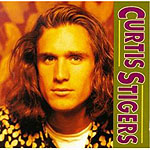
With all that said, your ballad-heavy blend of soul and rock translated into great commercial appeal back in the early ‘90s. Reflecting back was it an easy decision to make to break from the pop community and all that monetary success? "There's no upside of selling records in the world that I'm in now. There's just no comparison. I sold a million and a half copies of my first record and I usually sell about 40,000 of my records now. I make my living on the road. I make my living playing live. And, as far as regrets I have none ... regrets, I've had none," he laughs, slowly stuttering the words back out again; obviously ready to break into song at any moment. "I was so ready [to sing], but I wasn't sure of whether to go Sid Vicious or Frank Sinatra so I stopped."
"But yes, I'm now doing exactly what I dreamed of doing. I play music for people and I make a living at it. I like making records, but I love playing live. That's who I am and that's how I grew up. That's what music was all about to me playing live. I always found it very difficult to spend 3, 6 or 9 months in the studio making an album and then putting it out and sitting around hoping that I would have a hit single so that I could go tour a little bit. That to me is just the definition of agony!"
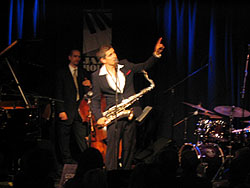
"I like to play. I like to play music. So, now I make records so that I can tour. I don't tour to support my records it's really the other way around. I'm the boss now. I do everything. I produce my records, I pick the songs, I practically book the flights and the hotels and that suits me perfectly. I never liked giving somebody else the decision making power. I hated having some guy in a suit telling me what music I should be playing. But I have to say when I made that first record that was exactly who I wanted to be. It sounded slicker than when I heard it in my head because I had producers that had Clive Davis breathing down their necks. And pop music wise it was a slicker time and so that's where that record went. And I don't regret that record, I love that record and those songs as that's who I was."
"But the next year that wasn't who I was. I didn't want to stay in the same place and I certainly didn't want to go backwards. I wanted to move well on forwards and that's where I ran afoul of the record company. So, it took me a while. I had to begin, with what all the press and the record company called the 'Reinvention of Myself.' Which was me just finally being allowed to be myself. But, even with that it took a while and I definitely didn't make money for a few years," he laughs. "I spent money. We saw the money that I had been lucky enough to make in the pop world and even the bit of money I made from 'The Bodyguard' soundtrack was spent just by living."
"So there was a point where I started to think well, this as quite a risk and that it was starting to get a little scary. And then it turned and then I started getting more gigs in England again. It was scary but it was the only thing that I could do. I couldn't do what Clive Davis wanted me to do. I couldn't just chase pop hits because that's what you do. It made me physically ill, the idea of making music that I didn't love. I'd rather sell shoes. I'd rather busk in the subways."
"And I don't mean to sound like a tragic person. I'm not trying to impress anybody. That's just who I am. I'm a pain in the ass," he laughs. "I just don't like doing anything that I don't want to do. I like to work hard and I like to make my music on my own terms. That's what I've done and somehow in the last few years it finally came around. All of a sudden I'm getting accolades, I'm getting press and I'm able to go out and play nice long tours of England, Germany and Denmark. And bring home money to pay the mortgage, you know. It was a little scary but it's finally paying off. Regrets no, it's just life couldn't be better right now."
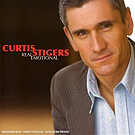
‘Real Emotional’ is a very strong–sounding, heartfelt album so did it feel any different putting it together than the other four, perhaps? "Yeah, it was. Each record has been a different thing. The first one I wanted to prove that I wasn't just a dilettante, I wasn't just a Rod Stewart coming over and making a vanity record. I wanted to say this is what I've done all my life. You just didn't know it. So, I made a pretty much straight ahead jazz record with a lot of standards and a lot of jazz-based stuff. The second record I started to dabble more in finding these more modern songs. On 'Secret Heart' there's a Ron Sexsmith tune, and there's a Randy Newman tune, and a Steve Earle tune. So, I was kinda thinking, 'Yeah, I can dig into these modern tunes a little bit.' The third record 'You Inspire Me,' that was when I decided what the hell, let's go for. Let's see if I can find a whole album's worth of great modern songs and do them as jazz tunes."
"And that album and 'I Think It's Gonna Rain Today' were like that. And they were made with a really cool band of guys that I don't really tour with. But they were still full on jazz records where we went into the studio and we played the songs from a chart, an idea where we were going but it was all very improvisational. Really no over dubbing at all."
"This record Larry [Goldings] and I went in ahead of the band and did some duets, we did some experimenting. We set out with the knowledge, with the plan that we would felt fine about over dubbing. That it wasn't going to have to be a jazz record because the jazz police said that's how you make jazz records. We decided we would borrow some basic tricks from the pop world, like over dubbing, like doing double duets - where Larry would play organ and I would sing and then we'd go back and I'd play sax and he'd play piano. Nothing groundbreaking, but just to take it out of that ... you, know when you make a jazz record you just go in and make a jazz record live with the band. It's how the band was playing that day and what they thought. Whereas I really wanted this one to be about the songs. I wanted the first and most important thing to be the stories that those songs tell. So, this record has definitely got elements of pop music but it's not a pop record by any means. You certainly aren't gonna hear it next to a Beyonce song on the radio."
"But, at the same time there are songs that the jazz police are gonna say, 'Wait, this isn't really swing-a-ding-a-do. This isn't what we expected!' Somebody asked me recently if I was setting out to have more commercial success with this record. And my thought was that I've actually risked alienating everybody on it," he sarcastically laughs. "Nobody's gonna like this damn thing, but me!"
"And it's not true obviously, it's just a joke when I say that. People have already responded very well to it. But they respond to the songs, they respond to the honesty and the emotion, and to the realness that comes through these stories; these great, great songs of the different writers who I've borrowed songs from."
Although, as much as that can be said, 'Real Emotional' does also seem to have a darker edge to it with regard some of the chosen down beat tracks. Was this also intentional, perhaps? "Yeah, this record is darker and more melancholy and has a lot less, for a better word, tempo than my previous record. I didn't worry about if there were enough up-tempo songs on this record. This is a pretty dark time, I'd say and it's reflected in most of the choices on this record. There are some light, frivolous songs - I mean, the Bob Dylan song is basically just a come on line; it's a great, brilliantly written pick up line - but 'American Tune' and 'Your Mind Is On Vacation,' and 'I Need You' are some of the darkest songs that I've recorded. I think the worlds in a mess and it seemed like that when the record was done it really reflected how I'd been feeling about the world and how the world is, frankly."
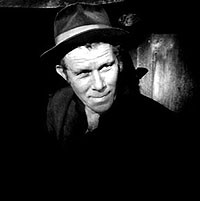
Please tell us more about your choice to finally record a Tom Waits song "Well, I've had the Tom Waits song 'San Diego Serenade' on my list - and I've got a list of 50, 60, or 70 songs at all times, as I think it's important for me to have something to work from - for a few years and have been thinking about recording it three records ago. And for one reason or another, and it was probably partly out of fear of recording such a great, well-known Tom Waits song, and not being sure I was worthy to sing 'San Diego Serenade' ... and I still might not be! But we finally found a way, Larry and I to present that song and give it the weight [Editor: No pun intended, I would imagine!] that it needed."
Did you record any other renditions for 'Real Emotional' that didn't make the final cut perhaps? "Well, there are plenty of songs that just fall off the back of the list, but not so much on this record. We pretty much recorded what we planned to record. But on previous records I've gone ahead and recorded three or four songs that didn't make the record. There was a Shaun Colvin song I cut, there was a Loudon Wainwright song that I cut. Songs that I absolutely love but we couldn't - either with that band or with the other group of songs that ended up on the record - make them fit. Somehow you just don't find a way to do that."
Through the years have you ever been inspired by anyone's quote(s)? "I've actually been reading a bunch of Tom Waits interviews recently and he says that when he and his wife [Kathleen Brennan] are having trouble getting a song on tape they say, 'The flamingo is sick'," he laughs. "So, sometimes the flamingo is just too sick. You just can't revive it. You just have to walk away. You have to say, 'All right, that flamingo's dinner!' Sometimes it just doesn't work. A certain group of songs will just fit together and some will just say, 'Well, I just don't belong here'."
How do you come up with your album titles? "I often don't know what an album is until three weeks after it's mixed. It's funny ... as I'm choosing a title I'll have to just listen to the record a lot, and a lot, and a lot and all of a sudden it'll just occur to me and I'll see what the album is all about. So, going into it I'm just looking for great stories to tell. And I suppose it's the way these songs hit me as I'm listening to them. And also the few songs that I write for my records, there is some sort of underlying theme that I sort of don't allow myself to stop and think about it until I've got the stuff on tape. I prefer to be instinctual about how I record records and how I make music. I've always been about my instinct and about letting myself be. But, so far there’s always been a theme, but it tends to show itself weeks later."
It seems that you hold a very special place in the hearts of us British folks also. Since your performance on the beloved chat show ‘Parkinson,’ your appearance on ‘Just The Two Of Us,’ and having been named Radio 2’s Jazz Artist of the Year just this past July, I'm wondering what it now is about England that has drawn you in after all this time? "You go where the love is," he gently laughs. "Back in '92 in those few early years of my recording career I was on all of those shows. Back then I was opening for Elton John, Eric Clapton and Rod Stewart at Wembley Arena. I was doing a lot of support stuff. And eventually by the end of '92 when I had that hit record I was headlining the same arenas. So, that's where it started."
"It certainly waned in the mid-to late '90s, but much changed. After my first record Brit Pop appeared and grunge appeared and the pop world became an entirely different thing. So, obviously my sort of self-reinvention followed that and I went back as somebody else and I had to work my way back in. I've been very lucky as Radio 2 has always taken very good care of me even in my quiet and lean years. When I was going out with just my acoustic guitar and playing little clubs and theatres around England. Radio 2 would still have me on, interview me and plug my shows. So, I've been very lucky there."
"Jonathan Ross has always been a real supporter of what I do. And [Michael] Parkinson has come to me later because of the jazz, as he's a big jazz fan. He's been terrific. He plays my stuff every Sunday on his radio show and on his TV show. It's an amazing thing as one appearance on a TV or radio show in England turns into something huge. Because, it's a small place and there's national radio and TV and you get to so many people that way."
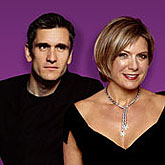
Please tell me more about your experience on the UK TV duet singing show, 'Just The Two Of Us'! "That 'Just The Two Of Us' thing was such a hooky thing! It was just basically 'Singing With The Stars' and it was such a cheesy thing. But jazz singers don't get on the BBC very often so it was something that I dreaded doing, but I had to! I just felt I had a daughter to put through university some day," he laughs, "and so you gotta do some things that are slightly painful and silly. And it was very silly, but luckily the woman that I drew as my partner [Penny Smith] just cannot sing, but happened to be incredibly funny and very smart about it. And so she sort of did this Lucille Ball thing about it, where we made a joke of the show ... and almost won the thing by being the comic element! When everyone else was pulling their hair out, gashing their teeth and crying because they were getting bad votes, we were going for bad votes! And the British public ended up loving her. But I was just there as the chivalrous protector of her."
Do you normally watch those kind of shows at home when you're relaxing? "I don't watch TV very often at all, but these are the kind of shows that whenever my wife has said, 'Let's watch American Idol' or something like that I have to run from the room screaming! These things are just horrible. So, we did our best to just dismantle the whole idea of the show. And the shows I did after that TV show I sold twice as many tickets as the tour before! So, who knows what's gonna sell tickets, but it certainly helps to have some friends at a big network."
Have you been to watch a live football [soccer] match over there yet? "No, I've never been to a live football game, I'm ashamed to say. When I'm there I'm so bloody busy, but I'm dying to. We do spend quite a bit of time in pubs," he laughs. "So, the boys and I have at least sampled football and a lot of ale. We're all four of us big fans of English ale."
So what's it like to tour in England compared to over here in the States? "It's much easier to tour there. That smallness is what makes it affordable to tour there. In the States Detroit is a hell of a long drive to Chicago, and then Chicago is a hell of a long drive to Minneapolis, and on and on and on. So, you can go all the way across from one side of the country to the other over there and it takes only a few hours and you've spanned the width of the country. It just makes it work a lot better. In addition to that I sold a lot of copies of my first album there. I did well here but I did very, very well in Europe; especially Germany, the UK and Denmark. Hey, you go where they pay you!"
"There's so many theatres in every town and city in England, Scotland and all over the place. I've been going there regularly since 1992. It's certainly my best market and my third home; as I have to call New York my second home. I do love England. London in particular, but really everywhere. We get all over the country. I really love it over there."
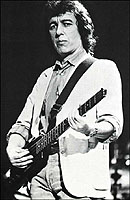
At the Radio 2 awards there's a photo of you talking to Bill Wyman. I’m wondering what was said between you? "You'll never know," he laughs. "It was so brief I can't believe that there's a photo! It was just an absolute thrill for me to meet Bill Wyman, but it was really a very brief thing. I was coming out of a press room, he was coming in ... and there's Bill Wyman. You put out your hand and you say, 'Oh my God. It's great to meet you. I can't believe that I'm meeting you. Especially at the BBC Jazz Awards of all things.' And that was it. It was all over in a flash. But that's one of the few things that I have to tell people here at home about the Jazz Awards. So, to tell them at the BBC Jazz Awards I met Bill Wyman, well, their eyes kinda light up!"
Was Bill always a musical hero of yours? "My mother claims that I was conceived to the chorus off 'Satisfaction.' And here I am meeting the bass player on it for God's sake," he laughs.
It seems that from what you endured traveling between France and Spain this June that you have to be one of the world’s unluckiest travelers! With American Airlines and/or British Airlines having lost your luggage numerous times recently how have you kept from going insane?! "Heathrow's in an absolute shambles right now. It's like the worst airport in the whole world. I have a friend who works there at one of the airlines and she says she has seen the Hanger where they are putting the lost bags ... and they just throw them in there and just leave 'em! And sooner or later they're gonna have to air lift them all to another country and sort them out as they don't have enough staff at Heathrow to do it."
So, you won't be flying into Heathrow again anytime soon then?! "Well, I actually just bought a plane ticket where I'm flying through Heathrow in four weeks! I don't know why I did it but I thought that maybe they've sorted it out by now! It's been a nightmare as the airlines are really in bad shape right now."
Did you eventually get all your lost luggage back again? "We have eventually gotten it all back, yeah. It took the better part of a week to get my drummer's cymbals back! So, every gig we got to he had to basically beg, borrow and borrow again a good set of cymbals. But luckily we were doing mostly jazz festivals where there were jazz drummers with great equipment. But jazz drummers cymbals are like a jazz singer’s voice. A drummer’s sound comes from the sound of his cymbals. So yeah, we have gotten them all back, but I spent three days in Paris wearing basically the same clothes. I felt sorry for the journalists that had to interview me," he laughs apologetically.
Knowing that you are a baritone I’m pretty sure you can also sing into the tenor range if desired. Do you agree and if so why haven’t we heard more of this on your albums? "Yeah, I have a pretty wide range and I can sing pretty high. I've never been able to call myself a tenor though as a real tenor can just ... well, Bono's a tenor. I can sing very high if I want to but it tends to sound like I'm working for it, you know."
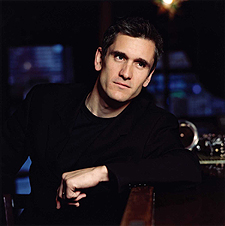
Finally, you’ve been self-quoted as calling yourself an “old road-weary jazz-warbling workhorse!” Is that really how you feel these days or would you like to redefine it for me now?! "That was probably just one of my blasts to my email lists," he laughs heartily. "I don't know what I am. I'm just a storyteller. That's how I look at myself as these days. I love telling stories whether I'm talking in-between songs or whether I'm singing the songs. That's how I'm defining myself these days. I'm also a dad, a husband ... and I wash the dishes!"
"But the “old road-weary jazz-warbling workhorse" probably just comes from being so bloody tired of sitting at airports waiting for them to tell us when the next flight is gonna be rescheduled for. And yes, I have definitely felt that way a couple of times this summer, but I always remind myself that it beats working. It's a good way to nearly make a living!"
Interviewed by Russell A. Trunk
'Real Emotional' CD Purchase Link
www.CurtisStigers.com
Back To Archives

